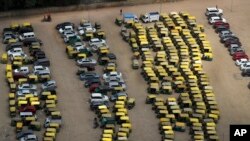Commuters in India's capital faced difficulties Thursday as much of the city's public transportation, including private buses, auto-rickshaws and some ride-hailing services, remained off the roads to protest a sharp increase in traffic fines under a new law.
The government hopes the new Motor Vehicles Act will bring order to India's chaotic roads with an almost tenfold increase in fines for traffic offenses.
The United Front of Transport Associations called for the strike in New Delhi to protest the higher fines, which took effect Sept. 1 as economic growth in India has slumped to a six-year low.
People who arrived by train at the New Delhi railway station had trouble finding transportation to their destinations in the city.
Deepak Kanojia, president of a local labor union, said public transport drivers are facing the brunt of the heightened fines.
“While policemen might give private vehicles a miss, they stop yellow taxi plates without fail and start finding problems with that vehicle,” he said.
The minister for road transport and highways, Nitin Gadkari, says the increase in fines is needed to improve the appalling safety record of India's roads, where more than 100,000 people are killed and nearly 500,000 injured in accidents every year.
Under the new law, the minimum penalty has been increased from $1.40 to $7. The penalty for driving without a license has risen from $14 to $70.
Traffic police across the country have taken to social media to educate citizens about the new rules. But many Indians are critical of the new law. Some posted pictures on Twitter of huge potholes on roads and asked what the government was doing to fix them.







